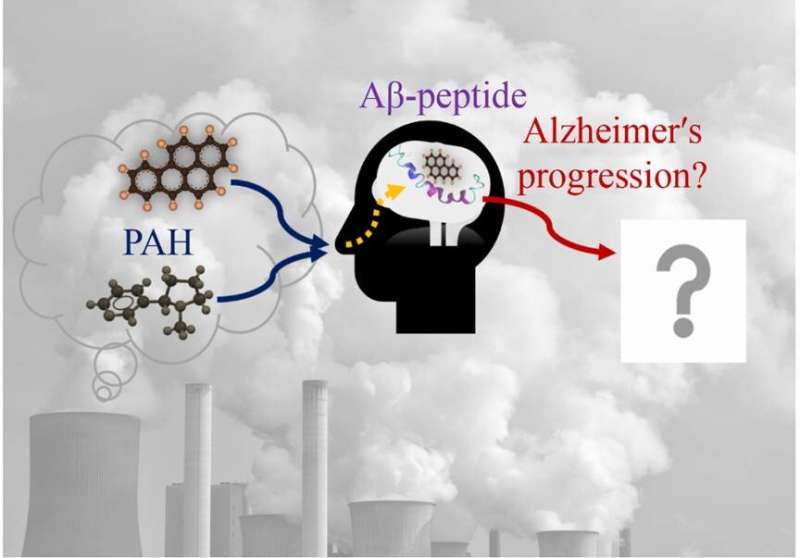This article has been reviewed according to Science X's editorial process and policies. Editors have highlighted the following attributes while ensuring the content's credibility:
fact-checked
proofread
Increased risk of Alzheimer's disease due to exposure to polycyclic aromatic hydrocarbons, suggests study

Polycyclic aromatic hydrocarbons (PAHs) are typical organic compounds found in cigarette smoke and vehicle exhaust. In addition, PAHs are produced from incomplete combustion of organic material and cooking. The highest concentrations of PM-bound PAHs ranged from 550 ng/m3 to 39,000 ng/m3, and have been observed in Chinese kitchens, fire stations, and ships.
Polycyclic aromatic hydrocarbons may combine with ultrafine particles (UFPs) in the air to form particle-bound PAHs. PM0.1 may adsorb large amounts of toxic organic compounds, and long-term exposure to indoor UFPs from cooking has resulted in nervous responses by the human brain. PAHs have been detected in the venous blood of people exposed to combustion by-products in rural areas of China at concentrations up to 762 ng/mL.
The Aβ peptide contains various isoforms, with 42 amino acids in its structure. It is more abundant in human cerebrospinal fluid. It has been shown that chronic exposure of fish to benzo[a]pyrene (B[a]P) resulted in increased concentrations of the Aβ42 peptide in the brain, leading to a decrease in their cognitive behavior, memory locomotor and motor activity. Aβ oligomers may contribute to the development of Alzheimer's disease (AD) by damaging neurons and disrupting electrochemical signals.
Polycyclic aromatic hydrocarbons including phenanthrene, pyrene and B[a]P have increased the aggregation kinetics of the Aβ-peptide. Although the aggregation of Aβ peptides and the formation of oligomers are enhanced in the presence of PAHs, what are the molecular interactions between Aβ polypeptides and PAHs?
To answer this question, researchers from Nazarbayev University, Tokyo University of Science and their teams collaborated to explore and reveal the effect of polycyclic aromatic hydrocarbons as the major compounds of cooking particles on the structure of Aβ42 peptide. Their study reveals that Aβ polypeptides interact strongly with polycyclic aromatic hydrocarbons of different properties, and that these organic pollutants alter the structure of Aβ42 and promote the progression of Alzheimer's disease. This study, titled "Effect of ambient polycyclic aromatic hydrocarbons and nicotine on the structure of Aβ42 protein," is published online in Frontiers of Environmental Science & Engineering.
In this study, the research team found that the structure of the Aβ42 peptide monomer was affected by benzo[a]pyrene, nicotine and phenanthrene molecules, depending on their hydrophobicity, size, and H-bonding capacity. The secondary structure of the Aβ42 peptide was changed by organic pollutants, with an almost 50% decrease in the α-helix and 2%–10% increase in the β-sheets of the peptide. The team's results also suggested that benzo[a]pyrene, nicotine, and phenanthrene might have an effect on the progression of Alzheimer's disease.
This study successfully conducted atomic and molecular dynamics studies using GROMACS to study the structure of the Aβ42 peptide monomer in the presence of benzo[a]pyrene, nicotine and phenanthrene. This work not only analyzed the effects of organic pollutants on the results of the Aβ peptide monomer at the molecular level, but also provides guidance for the treatment of Alzheimer's disease, and increases attention to the neurodegenerative disorders caused by air pollution.
More information: Samal Kaumbekova et al, Effect of ambient polycyclic aromatic hydrocarbons and nicotine on the structure of Aβ42 protein, Frontiers of Environmental Science & Engineering (2022). DOI: 10.1007/s11783-023-1615-2
Provided by Higher Education Press





















